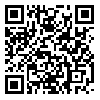Volume 10, Issue 38 (3-2020)
NCMBJ 2020, 10(38): 41-50 |
Back to browse issues page
Download citation:
BibTeX | RIS | EndNote | Medlars | ProCite | Reference Manager | RefWorks
Send citation to:



BibTeX | RIS | EndNote | Medlars | ProCite | Reference Manager | RefWorks
Send citation to:
Mosafer M, Zia-Jahromi N. The effect of thyroid hormones on glycosylated
hemoglobin and glycosylated albumin in patients
with type 1 diabetes and Hashimoto disease and
comparison with healthy people.. NCMBJ 2020; 10 (38) :41-50
URL: http://ncmbjpiau.ir/article-1-1285-en.html
URL: http://ncmbjpiau.ir/article-1-1285-en.html
Department of Biology, Science Faculty, Shahrekord Branch, Islamic Azad University, Shahrekord, Iran
Abstract: (4193 Views)
Aim and Background:Hashimoto's disease is a thyroid gland autoimmune disease that can lead to type 1 diabetes autoimmune disease and cause irreparable harm to the patient. The aim of this study was to evaluate the effect of thyroid hormones on glycosylated hemoglobin and glycosylated albumin in Hashimoto patients with type 1 diabetes and in comparison with healthy subjects.
Material and methods:In this study, 30 patients with Hashimoto and type 1 diabetes, 30 patients with Hashimoto and 30 healthy subjects as control group were studied. From these subjects, 5 ml of venous blood was taken to measure T3, T4 and TSH, hemoglobin glycosylated and Glycosylated albumin, and then the serum levels of these factors were measured.
Results:The results of this study showed that in patients with Hashimoto's and type 1 diabetes, the amount of thyroid peroxidase antibodies decreased significantly (P-val> 0.001), and TSH increased significantly in patients (0.043). P-val). The hormone triiodothyronine did not change significantly in patients with Hashimoto's disease compared to the healthy group (P-val = 0.168). Thyroxine was reduced in patients with Hashimoto's disease (P-val = 0.013). Glucose was significantly increased in patients with Hashimoto's disease (P-val = 0.036). Glycosylated hemoglobin was significantly increased in patients with Hashimoto's disease (P-val = 0.013). Glycosylated albumin did not change significantly in patients with Hashimoto's disease (P-val = 0.0191).
Conclusion: Overall, the results of this study showed that Hashimoto's disease was associated with type 1 diabetes with changes in thyroid hormones, peroxidase thyroid antibodies, as well as glucosamine hemoglobin, and that these parameters could be used as biomarkers to diagnose early symptoms.
Material and methods:In this study, 30 patients with Hashimoto and type 1 diabetes, 30 patients with Hashimoto and 30 healthy subjects as control group were studied. From these subjects, 5 ml of venous blood was taken to measure T3, T4 and TSH, hemoglobin glycosylated and Glycosylated albumin, and then the serum levels of these factors were measured.
Results:The results of this study showed that in patients with Hashimoto's and type 1 diabetes, the amount of thyroid peroxidase antibodies decreased significantly (P-val> 0.001), and TSH increased significantly in patients (0.043). P-val). The hormone triiodothyronine did not change significantly in patients with Hashimoto's disease compared to the healthy group (P-val = 0.168). Thyroxine was reduced in patients with Hashimoto's disease (P-val = 0.013). Glucose was significantly increased in patients with Hashimoto's disease (P-val = 0.036). Glycosylated hemoglobin was significantly increased in patients with Hashimoto's disease (P-val = 0.013). Glycosylated albumin did not change significantly in patients with Hashimoto's disease (P-val = 0.0191).
Conclusion: Overall, the results of this study showed that Hashimoto's disease was associated with type 1 diabetes with changes in thyroid hormones, peroxidase thyroid antibodies, as well as glucosamine hemoglobin, and that these parameters could be used as biomarkers to diagnose early symptoms.
Type of Study: Research Article |
Subject:
Cellular and molecular
Received: 2020/05/14 | Accepted: 2020/05/14 | Published: 2020/05/14
Received: 2020/05/14 | Accepted: 2020/05/14 | Published: 2020/05/14
| Rights and permissions | |
 |
This work is licensed under a Creative Commons Attribution-NonCommercial 4.0 International License. |





